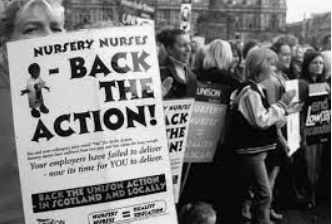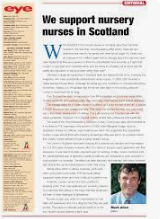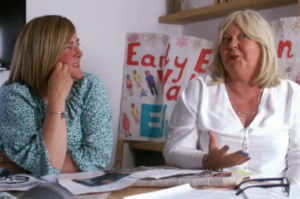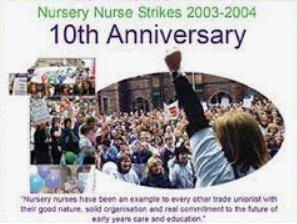
by Sue Palmer
 A strike is always a last resort. The last thing low-paid workers need is to sacrifice their earnings while standing in the cold on a picket line. But sometimes striking is the only way to fight injustice, which is why, twenty years ago, Scottish nursery workers embarked on a series of one-, two- and three-day strikes. It escalated, in 2004, into an all-out strike across the country for fourteen weeks, the longest strike since the miners’ in 1984. On 7th March, the women involved will be remembered in an episode of ‘The Women Who Changed Modern Scotland’ on BBC Scotland TV.
A strike is always a last resort. The last thing low-paid workers need is to sacrifice their earnings while standing in the cold on a picket line. But sometimes striking is the only way to fight injustice, which is why, twenty years ago, Scottish nursery workers embarked on a series of one-, two- and three-day strikes. It escalated, in 2004, into an all-out strike across the country for fourteen weeks, the longest strike since the miners’ in 1984. On 7th March, the women involved will be remembered in an episode of ‘The Women Who Changed Modern Scotland’ on BBC Scotland TV.
Jill McNaughton, who appears in the programme, remembers the frustration leading to the strike: ‘It was partly about pay – not just that it was way too low, but because rates across local authorities varied. We wanted a fair national wage. But we also wanted proper recognition for the job we do. The nursery expansion of the 1990s had led to far greater accountability – profiles and form-filling and so on. That meant more and more paperwork that took us away from the children. And no one seemed to get how important our work with the children was.’
Fair pay for nursery nurses!
Jill’s feelings were clearly shared by other UNISON members, who in April 2003 voted 90% in favour of strike action. To help finance the one-, two- and three-day strikes, nursery nurses organised bucket collections and surprised trade union leaders by the imagination and creativity of the demos they staged to publicise the cause. Their actions paid off because, just as the public today is supporting the nurses’ strike, parents in 2023 were overwhelmingly on the side of Scotland’s nursery nurses.
COSLA (the local authorities’ organisation) and local employers completely underestimated the levels of solidarity the strike generated among this overwhelming female workforce and assumed their enthusiasm would flag after a few months. They were stunned when, in February 2004, 81% of them voted for an all-out strike.
It led to huge media interest, fanned by more demos, including a Suffragette march in Dundee and a march across the Forth Road Bridge where workers from Fife met up in the middle with workers from Edinburgh. Jill McNaughton and her friend Loraine Millar were sent down to London to raise funds.
A voice and something important to say

Jill and Loraine today, on the BBC programme
‘I have to admit it was one of the best times of my life,’ Jill remembers. ‘We were put up by two GPs, who were really kind to us – it’s amazing how many people out there are ready to help fight your cause. We’d go into schools and places, make a wee speech and come out with a bucket filled with money. One time we got sent to a London theatre and found ourselves on the stage with Pete Doherty and the Libertines! But it was the whole strike really – the solidarity and the friendships we made. I was married with no kids and time on my hands to get involved – we had a strike centre in our spare bedroom full of banners and stuff! It made me feel that I had a voice and something important to say.’
Sadly, as the weeks wore on, the local authorities were able to break the strike. ‘People were really struggling by this time, some LAs made settlement and folk started drifting off,’ says Jill. ‘My mum rang me in London and said “Dundee’s gone back to work.” After fourteen weeks it was over. I remember walking along road crying and feeling deflated (despite making songs for the girls to sing about being united and returning to work). However, back at the nursery I was greeted by a group of parents and line of children all cheering! They’d made cards and pictures at home. I guess it was their way of showing they knew our worth and it honestly made me feel better than any of them will ever know!’
Twenty years on
 So how does the early years sector stand now, twenty years on? Any improvements in terms of public profile have been eroded by time, we’re still arguing with COSLA about pay inequalities, nursery workers are even more beset with paperwork and box-ticking. And government and public still ‘don’t get’ the true significance of ELC for children’s long-term development, education and well-being.
So how does the early years sector stand now, twenty years on? Any improvements in terms of public profile have been eroded by time, we’re still arguing with COSLA about pay inequalities, nursery workers are even more beset with paperwork and box-ticking. And government and public still ‘don’t get’ the true significance of ELC for children’s long-term development, education and well-being.
But it’s good to see BBC Scotland celebrating the nursery nurses’ strike in their programme. And good to be reminded of the impact they made, demonstrating the initiative, creativity and strength of the early years workforce.
As UNISON put it on the tenth anniversary of the strike, ‘Nursery nurses have been an example to every other trade unionist with their good nature, solid organisation and real sensitivity to the future of early years care and education.’ Of all the women who are changing modern Scotland, it’s those who care for children during their most formative years who’ll make the greatest change for the better in the long term.
See the trailer for The Women Who Changed Modern Scotland here.
The programmes start on 21-2-23 at 8 p.m.


